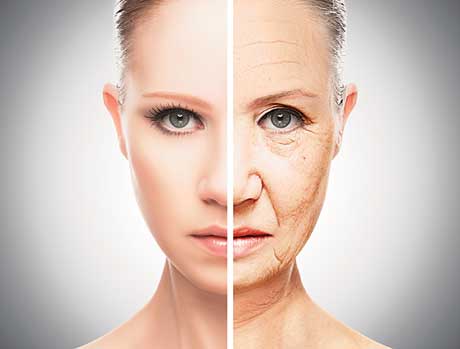Menopause is a time of many changes and of rapid hormone shifts. You! takes a look...
health
Menopause is a time of many changes and of rapid hormone shifts. You! takes a look...
Menopause is a normal, natural event that marks a big step in every woman’s life. Menopause is officially defined as complete when menstruation has ceased for a year. It is the time in a woman’s life when the function of the ovaries ceases and she can no longer become pregnant. On average, most women begin to notice their periods becoming less frequent in their late forties to early fifties, while for some this may not occur until well into their sixties. As a rough ‘rule of thumb’, women tend to undergo menopause at an age similar to that of their mothers.
Reading the signs
The first indication of menopause is usually an increase in the length of time between your periods. Others, however, may demonstrate a host of different symptoms, such as irregular vaginal bleeding; mood swings, headaches, sleep disturbances, a faster heartbeat and an increased temperature, more sweating and spontaneous hot flashes. These issues can cause discomfort and inconvenience at the time, but are ultimately only temporary, albeit for a few years.
Irregular vaginal bleeding: Menstrual periods (menses) may occur more frequently (meaning the cycle shortens in duration), or they may get farther and farther apart (meaning the cycle lengthens in duration) before stopping. A woman can have irregular periods for years prior to reaching menopause. It is important to remember that all women who develop irregular menses should be evaluated by their doctor to confirm that the irregular menses are due to perimenopause and not as a sign of another medical condition.
Hot flashes and night sweats: Hot flashes are common among women undergoing menopause. A hot flash is a feeling of warmth that spreads over the body and is often most pronounced in the head and chest. Sometimes hot flashes are accompanied by night sweats (episodes of drenching sweats at nighttime). This may lead to awakening and difficulty falling asleep again, resulting in unrefreshing sleep and daytime tiredness.
Ways to deal with menopause symptoms:
Hot Flash Cool down: Remember to keep cool to beat hot flashes: try dressing in loose-fitting clothing, avoiding alcohol and spicy foods, and also consider using ice packs and cooling fans.
Keep a diary to track what sets off your hot flashes. Caffeine? Alcohol? A hot room? Stress? All are common causes. When a flash starts, take slow, deep breaths, in your nose and out your mouth. Flaxseed and flaxseed oil may decrease hot flashes and have the added benefit of reducing joint and muscle pain for some women.
Freeze out night sweats: At night, hot flashes can go on for 3 minutes or more, leaving you drenched in sweat and unable to sleep. But there are ways to keep your cool. Trade the heavy flannels for light PJs. Put a bag of frozen peas under your pillow. Flip the pillow through the night and put your face on the cool side. Choose layers of light blankets over one thick quilt. Use a bedside fan to keep air moving.
Sleep well: Restful sleep will help you cope with night sweats and other menopausal symptoms. Improve your sleep by avoiding exercise within two hours of bedtime; going to bed at the same time every night; wearing lighter clothing and keeping your room cool.
Mood highs and oh-so lows: It’s like PMS, only amped up - crying jags, happy happies, cranky crankies. These are common for women around the time of menopause. And if you had bad PMS, the hormonal changes that happen during this time may cause even bigger mood swings. Yoga and tai chi can help here, too. So can doing fun things with friends or family. Your doctor may suggest a low-dose birth control pill, antidepressants, and alternative treatments for mood changes. Omega 3 fatty acids not only fight heart disease, they are also believed to be a mood stabilizer. Add the extra boost of Omega 3 to your diet by consuming fish such as tuna, salmon or trout.
Get regular exercise: At any age, it’s advisable to follow a healthy, low-fat diet and make sure you get plenty of exercise, but many experts consider this particularly important as you undergo menopause. There’s evidence that women who are more active tend to suffer less from the symptoms of the menopause. Exercise is important not only for the relief of short-term symptoms, but also to protect your body from heart disease and osteoporosis.
Don’t let menopause stand in the way of intimacy:
Intimacy can be reassuring and comforting, both physically and emotionally, and some women have actually reported stronger orgasms during menopause. It is also important, for your physical and mental wellbeing, to stay sexually active after menopause. Sexual stimulation and orgasms boost endogenous testosterone production which helps with vaginal muscle tone. Vaginal dryness can occur during menopause, but this can be easily relieved with the use of a soothing vaginal moisturizer.
Remember that you don’t have to go through menopause alone
Having someone to talk to - a friend, family member or your doctor - can make all the difference during menopause. You may find it helpful to talk to other women who are going through or have gone though the changes you’re going through during menopause.
Menopause is a time of many changes and of rapid hormone shifts. When it’s over you still want to be healthy and cheerful as you head into the next phase of your life. Don’t ignore your symptoms if they seem to be disrupting your life - read, do research and talk to your doctor. Keep your perspective and sense of humor as you wrestle and cope with the challenges - this, too, shall pass.